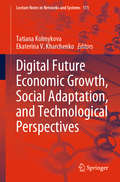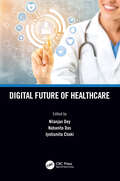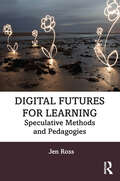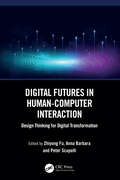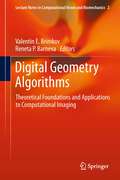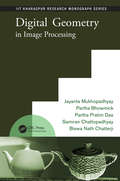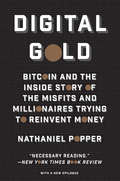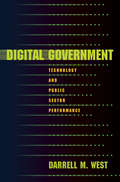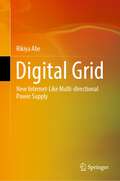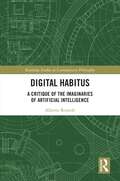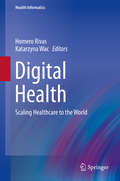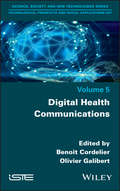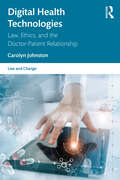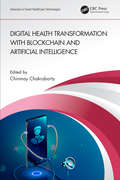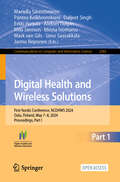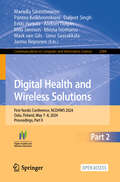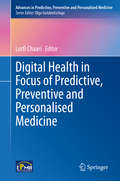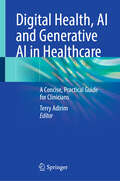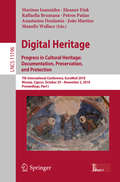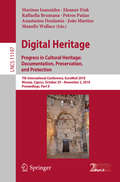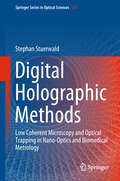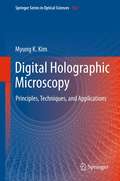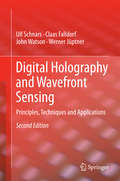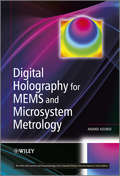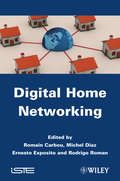- Table View
- List View
Digital Future Economic Growth, Social Adaptation, and Technological Perspectives (Lecture Notes in Networks and Systems #111)
by Tatiana Kolmykova Ekaterina V. KharchenkoThis book provides a systemic view on the digital future from the perspectives of various socio-humanitarian sciences: economics, social sciences, pedagogics and law. Presenting selected papers from the multi-disciplinary international conference “Climate changes and economy of the future: global transformation”, which was held at Pskov State University (Russia) on November 13–14, 2019, it offers a comprehensive overview of the current problems and the future potential of digital transformations of economic activities. This multidisciplinary book includes the latest research on the opportunities of the digital economy and the social and ecological consequences of its implementation, and as such offers a “road map” for development. It also features scientific and practical recommendations to allow effective management of the digitization process according to the current priorities.
Digital Future of Healthcare
by Nilanjan DeyThis book focuses on the applications of different digital platforms in the field of healthcare. It describes different devices used in digital healthcare, their benefits, diagnosis, use in treatment, and use cases related to mobile healthcare. Further, it covers machine and deep learning, blockchain technology, big data analytics as relevant to digital healthcare, telehealth technology, and digital applications in the field of push-and-pull pharma marketing. Overall, it enables readers to understand the basics of decision-making processes using digital techniques for the healthcare field. Features: Discusses various aspects of digitization of healthcare systems Examines deployment of machine learning including IoT and medical analytics Provides studies on the design, implementation, development, and management of intelligent healthcare systems Includes sensor-based digitization of healthcare data Reviews real-time advancement and challenges of digital communication in the field of healthcare This book is aimed at researchers and graduate students in healthcare, internet of things, machine learning, computer science, robotics, wearables, electrical engineering, and biomedical engineering.
Digital Futures for Learning: Speculative Methods and Pedagogies
by Jen RossDigital Futures for Learning offers a methodological and pedagogical way forward for researchers and educators who want to work imaginatively with "what’s next" in higher education and informal learning. Today’s debates around technological transformations of social, cultural and educational spaces and practices need to be informed by a more critical understanding of how visions of the future of learning are made and used, and how they come to be seen as desirable, inevitable or impossible. Integrating innovative methods, key research findings, engaging theories and creative pedagogies across multiple disciplines, this book argues for and explores speculative approaches to researching and analysing post-compulsory and informal learning futures – where we are, where we might go and how to get there.
Digital Futures in Human-Computer Interaction: Design Thinking for Digital Transformation
by Zhiyong Fu Anna Barbara Peter ScupelliThe application of futures thinking in Human-Computer Interaction (HCI) has become increasingly important in recent years. Integrating speculative thinking with future design approaches has allowed HCI researchers to explore the potential impacts of technology on digital society. However, the implementation and application of futures thinking in HCI research is an emerging area. Digital Futures in Human-Computer Interaction: Design Thinking for Digital Transformation fills this gap by systematically analyzing HCI's innovation trends in the digital era.This book explores the dialogue between digital transformation and futures thinking for alternative visions of HCI research. The book highlights significant trends and advancements in futures thinking related to HCI. Case studies illustrate the role of futures thinking, offering readers a broad overview of the subject while detailing the competencies and practices that can lead to successful futures design.This engaging and informative reference will appeal to students, academics, and researchers interested in various design aspects related to HCI. These aspects include service design, sustainable design, product design, space design, visual communication, design education, futures studies, and social innovation.
Digital Geometry Algorithms
by Reneta P. Barneva Valentin E. BrimkovDigital geometry emerged as an independent discipline in the second half of the last century. It deals with geometric properties of digital objects and is developed with the unambiguous goal to provide rigorous theoretical foundations for devising new advanced approaches and algorithms for various problems of visual computing. Different aspects of digital geometry have been addressed in the literature. This book is the first one that explicitly focuses on the presentation of the most important digital geometry algorithms. Each chapter provides a brief survey on a major research area related to the general volume theme, description and analysis of related fundamental algorithms, as well as new original contributions by the authors. Every chapter contains a section in which interesting open problems are addressed.
Digital Geometry in Image Processing
by Samiran Chattopadhyay Jayanta Mukhopadhyay Partha Pratim Das Partha Bhowmick Biswa Nath ChatterjiExploring theories and applications developed during the last 30 years, Digital Geometry in Image Processing presents a mathematical treatment of the properties of digital metric spaces and their relevance in analyzing shapes in two and three dimensions. Unlike similar books, this one connects the two areas of image processing and digital geometry,
Digital Gold: Bitcoin and the Inside Story of the Misfits and Millionaires Trying to Reinvent Money
by Nathaniel PopperA New York Times reporter&’s &“vivid&” account of the dramatic rise of Bitcoin and how it has led to untold riches for some—and prison terms for others (Financial Times). Shortlisted for the Financial Times and McKinsey Business Book of the YearA New York Times Book Review Editor&’s Choice The notion of a new currency, maintained by the computers of users around the world, has been the butt of many jokes, but that has not stopped it from growing into a technology worth billions of dollars, supported by the hordes of followers who have come to view it as the most important new idea since the creation of the Internet. Believers from Beijing to Buenos Aires see the potential for a financial system free from banks and governments. More than just a tech industry fad, Bitcoin has threatened to decentralize some of society&’s most basic institutions. An unusual tale of group invention, Digital Gold charts the rise of the Bitcoin technology through the eyes of the movement&’s colorful central characters, including an Argentinian millionaire, a Chinese entrepreneur, Tyler and Cameron Winklevoss, and Bitcoin&’s elusive creator, Satoshi Nakamoto. &“Engrossing.&” —Library Journal &“An elegant, thrilling tour-de-force. . . .The fast-paced action never stops.&” —William D. Cohan, New York Times–bestselling author of Power Failure
Digital Government: Technology and Public Sector Performance
by Darrell M. WestFew developments have had broader consequences for the public sector than the introduction of the Internet and digital technology. In this book, Darrell West discusses how new technology is altering governmental performance, the political process, and democracy itself by improving government responsiveness and increasing information available to citizens. Using multiple methods--case studies, content analysis of over 17,000 government Web sites, public and bureaucrat opinion survey data, an e-mail responsiveness test, budget data, and aggregate analysis--the author presents the most comprehensive study of electronic government ever undertaken. Among other topics, he looks at how much change has taken place in the public sector, what determines the speed and breadth of e-government adoption, and what the consequences of digital technology are for the public sector. Written in a clear and analytical manner, this book outlines the variety of factors that have restricted the ability of policy makers to make effective use of new technology. Although digital government offers the potential for revolutionary change, social, political, and economic forces constrain the scope of transformation and prevent government officials from realizing the full benefits of interactive technology.
Digital Grid: New Internet-Like Multi-directional Power Supply
by Rikiya AbeThis book is about Digital Grids, which eliminate the electrical constraints of power grids, provide a mechanism for free electricity trading, make full use of renewable energy, and remove human energy constraints. It is rare to experience an era of great change that shakes the social structure. The great transformation of the social structure brought about by the Internet is just one of them. It is doubtful that people at the time when that transformation began could realize just how great and momentous the change would be, but now all indications are that the energy industry will bring about a major transformation of the social structure. This book, The Digital Grid, aims to show the far-reaching effects of that concept and how it will be realized.
Digital Habitus: A Critique of the Imaginaries of Artificial Intelligence (Routledge Studies in Contemporary Philosophy)
by Alberto RomeleThis book proposes a new theoretical framework for approaching the causes and effects that digital technologies and the imaginaries related to them have on the processes of self-interpretation and subjectivation. It formulates three main theses. First, it argues that today’s digital technologies, which are primarily based on artificial intelligence (AI) algorithms and big data are formidable habitus machines: they offer increasingly personalized services, but these machines are actually indifferent to individuals and their personalities. Second, this book contends that the effectiveness of these machines does not depend solely on their concrete capacity to classify the social world. It also depends on the expectations, hopes, fears, and imaginaries that we have concerning these technologies and their capacities. This cultural habitus—a worldview, or world picture—leads us to believe in the concrete effectiveness of AI and its potential for our societies. Third, the author takes this Bourdieusian notion of habitus and connects it to current “empirical turn” in philosophy of technology. He contends that, by looking too closely at the things themselves, many philosophers of technology have deprived themselves of the possibility to study the symbolic conditions of possibility in which single technological artifacts are always embedded. Digital Habitus will appeal to scholars and students working in philosophy of technology, the ethics of artificial intelligence, media studies, and science and technology studies.
Digital Health
by Homero Rivas Katarzyna WacThis book presents a comprehensive state-of the-art approach to digital health technologies and practices within the broad confines of healthcare practices. It provides a canvas to discuss emerging digital health solutions, propelled by the ubiquitous availability of miniaturized, personalized devices and affordable, easy to use wearable sensors, and innovative technologies like 3D printing, virtual and augmented reality and driverless robots and vehicles including drones. One of the most significant promises the digital health solutions hold is to keep us healthier for longer, even with limited resources, while truly scaling the delivery of healthcare. Digital Health: Scaling Healthcare to the World addresses the emerging trends and enabling technologies contributing to technological advances in healthcare practice in the 21st Century. These areas include generic topics such as mobile health and telemedicine, as well as specific concepts such as social media for h ealth, wearables and quantified-self trends. Also covered are the psychological models leveraged in design of solutions to persuade us to follow some recommended actions, then the design and educational facets of the proposed innovations, as well as ethics, privacy, security, and liability aspects influencing its acceptance. Furthermore, sections on economic aspects of the proposed innovations are included, analyzing the potential business models and entrepreneurship opportunities in the domain.
Digital Health Communications
by Benoit Cordelier Olivier GalibertECHNOLOGICAL PROSPECTS AND SOCIAL APPLICATIONS SET Coordinated by Bruno SalguesThere are many controversies with respect to health crisis management: the search for information on symptoms, misinformation on emerging treatments, massive use of collaborative tools by healthcare professionals, deployment of applications for tracking infected patients. The Covid-19 crisis is a relevant example about the need for research in digital communications in order to understand current health info communication.After an overview of the challenges of digital healthcare, this book offers a critical look at the organizational and professional limits of ICT uses for patients, their caregivers and healthcare professionals. It analyzes the links between ICT and ethics of care, where health communication is part of a global, humanistic and emancipating care for patients and caregivers. It presents new digitized means of communicating health knowledge that reveal, thanks to the Internet, a competition between biomedical expert knowledge and experiential secular knowledge.
Digital Health Technologies: Law, Ethics, and the Doctor-Patient Relationship (Law and Change)
by Carolyn JohnstonIncreasingly digital technologies are used in healthcare. This book explores eight digital health technologies, situated the context of a life span, from high-throughput genomic sequencing technologies and do-it-yourself (DIY) insulin delivery for diabetes management in paediatrics, to the use of robotic care assistants for older adults and digital advance care decisions. A scene-setting case scenario at the start of each chapter describes the digital technology and identifies the sometimes competing interests of the key stakeholders. Broad themes of resource allocation, access to technologies, informed consent, privacy of health data and ethical concerns are considered in context, alongside analysis of legal duties owed by healthcare professionals to act in their patients’ best interests. This book addresses legal and ethical issues arising from the use of emerging digital health technologies and is of interest to academics, clinicians and regulators and anyone interested in the development of health technologies and the challenges they may present. It focusses on the Australian legal framework, with some comparison to other jurisdictions.
Digital Health Transformation with Blockchain and Artificial Intelligence (Advances in Smart Healthcare Technologies)
by Chinmay ChakrabortyThe book Digital Health Transformation with Blockchain and Artificial Intelligence covers the global digital revolution in the field of healthcare sector. The population has been overcoming the COVID-19 period; therefore, we need to establish intelligent digital healthcare systems using various emerging technologies like Blockchain and Artificial Intelligence. Internet of Medical Things is the technological revolution that has included the element of "smartness" in the healthcare industry and also identifying, monitoring, and informing service providers about the patient’s clinical information with faster delivery of care services. This book highlights the important issues i.e. (a) How Internet of things can be integrated with the healthcare ecosystem for better diagnostics, monitoring, and treatment of the patients, (b) Artificial Intelligence for predictive and preventive healthcare systems, (c) Blockchain for managing healthcare data to provide transparency, security, and distributed storage, and (d) Effective remote diagnostics and telemedicine approach for developing smart care. The book encompasses chapters belong to the blockchain, Artificial Intelligence, and Big health data technologies. Features: Blockchain and internet of things in healthcare systems Secure Digital Health Data Management in Internet of Things Public Perception towards AI-Driven Healthcare Security, privacy issues and challenges in adoption of smart digital healthcare Big data analytics and Internet of things in the pandemic era Clinical challenges for digital health revolution Artificial intelligence for advanced healthcare Future Trajectory of Healthcare with Artificial Intelligence 9 Parkinson disease pre-diagnosis using smart technologies Emerging technologies to combat the COVID-19 Machine Learning and Internet of Things in Digital Health Transformation Effective Remote Healthcare and Telemedicine Approaches Legal implication of blockchain technology in public health This Book on "Digital Health Transformation with Blockchain and Artificial Intelligence" aims at promoting and facilitating exchanges of research knowledge and findings across different disciplines on the design and investigation of secured healthcare data analytics. It can also be used as a textbook for a Masters course in security and biomedical engineering. This book will also present new methods for the medical data analytics, blockchain technology, and diagnosis of different diseases to improve the quality of life in general, and better integration into digital healthcare.
Digital Health and Wireless Solutions: First Nordic Conference, NCDHWS 2024, Oulu, Finland, May 7–8, 2024, Proceedings, Part I (Communications in Computer and Information Science #2083)
by Daljeet Singh Miia Jansson Mariella Särestöniemi Pantea Keikhosrokiani Erkki Harjula Aleksei Tiulpin Minna Isomursu Mark Van Gils Simo Saarakkala Jarmo ReponenThis two-volume set constitutes the refereed proceedings of the First Nordic Conference on , Digital Health and Wireless Solutions, NCDHWS 2024, held in Oulu, Finland, during May 7–8, 2024. The 51 full papers included in this book together with 7 short papers were carefully reviewed and selected from 100 submissions. They were organized in topical sections as follows: Part I: Remote Care and Health Connectivity Architectures in 6G Era.- User Experience and Citizen Data.- Digitalization in Health Education.- Digital Health Innovations.- Digital Care Pathways. Part II: Clinical Decision Support and Medical AI.- Digital Care Pathways.- Novel Sensors and Bioinformatics.- Health Technology Assessment and Impact Evaluation.- Wireless Technologies and Medical Devices. This book is open access.
Digital Health and Wireless Solutions: First Nordic Conference, NCDHWS 2024, Oulu, Finland, May 7–8, 2024, Proceedings, Part II (Communications in Computer and Information Science #2084)
by Daljeet Singh Miia Jansson Mariella Särestöniemi Pantea Keikhosrokiani Erkki Harjula Aleksei Tiulpin Minna Isomursu Mark Van Gils Simo Saarakkala Jarmo ReponenThis two-volume set constitutes the refereed proceedings of the First Nordic Conference on , Digital Health and Wireless Solutions, NCDHWS 2024, held in Oulu, Finland, during May 7–8, 2024. The 51 full papers included in this book together with 7 short papers were carefully reviewed and selected from 100 submissions. They were organized in topical sections as follows: Part I: Remote Care and Health Connectivity Architectures in 6G Era.- User Experience and Citizen Data.- Digitalization in Health Education.- Digital Health Innovations.- Digital Care Pathways. Part II: Clinical Decision Support and Medical AI.- Digital Care Pathways.- Novel Sensors and Bioinformatics.- Health Technology Assessment and Impact Evaluation.- Wireless Technologies and Medical Devices. This book is open access.
Digital Health in Focus of Predictive, Preventive and Personalised Medicine (Advances in Predictive, Preventive and Personalised Medicine #12)
by Lotfi ChaariThe edition will cover proceedings of the second International conference on digital health Technologies (ICDHT 2019). The conference will address the topic of P4 medicine from the information technology point of view, and will be focused on the following topics: - Artificial Intelligence for health • Knowledge extraction • Decision-aid systems • Data analysis and risk prediction • Machine learning, deep learning - Health data processing • Data preprocessing, cleaning, management and mining • Computer-aided detection • Big data analysis, prediction and prevention • Cognitive algorithms for healthcare handling dynamic context management • Augmented reality, Motion detection and activity recognition - Devices, infrastructure and communication • Wearable & connected devices • Communication infrastructures, architectures and standards Blockchain for e-Health • Computing/storage infrastructures for e-Health • IoT devices & architectures for Smart Healthcare - Health information systems • Telemedicine, Teleservices • Computing/storage infrastructures for e-Health • Clinical Data Visualisation Standards - Security and privacy for e-health • Health data Analytics for Security and Privacy • E-health Software and Hardware Security • Embedded Security for e-health - Applications in P4 medicine </
Digital Health, AI and Generative AI in Healthcare: A Concise, Practical Guide for Clinicians
by Terry AdirimThe purpose of this title is to provide a comprehensive foundation for all medical professionals and healthcare-professions students in understanding Artificial Intelligence (AI). With the advent of generative AI, including the release of Open AI’s ChatGPT in 2022, the world entered a new age of rapid advancements in technology that will significantly change the way clinicians practice medicine, operate healthcare institutions, and conduct research. At the heart of this penetrating book is the idea that medical schools, medical training programs and other health education institutions must undertake a key role in developing AI literacy for clinicians across the spectrum of medical education that includes all health professions. Moreover, assert the authors, AI literacy should be incorporated within medical school curriculums as a core competency, as well as into graduate medical education training programs and continuing medical education courses. This timely and easy-to-read guide offers a wide range of chapters that discuss the core concepts and issues relating to AI in medicine, including a basic understanding of algorithms, machine learning, large language models and natural language processing, the limits and pitfalls of AI, ethical and legal issues, the evolving regulatory landscape around AI, as well as how AI is currently being used in healthcare, to name just several compelling topics. Additionally, AI technologies will change how medical school curriculums are delivered and how student competencies are assessed, maintain the authors. Therefore, medical educators will not only need to rethink how and what medical information is conveyed to students during formal instruction, but also must be prepared for AI-powered programs being used to assess students and trainees for the purpose of licensure and board certification. A timely and soon-to-be gold standard resource in the field, Digital Health, AI, and Generative AI: A Concise, Practical Guide for Clinicians will be of great interest to medical professionals, trainees, administrators, policymakers, and anyone interested in the fast-evolving intersection of digital technologies and healthcare.
Digital Heritage. Progress in Cultural Heritage: 6th International Conference, Euromed 2016, Nicosia, Cyprus, October 31 - November 5, 2016, Proceedings, Part I (Lecture Notes in Computer Science #10058)
by Marinos Ioannides Eleanor Fink João Martins Raffaella Brumana Petros Patias Anastasios Doulamis Manolis WallaceThis two-volume set LNCS 11196 and LNCS 11197 constitutes the refereed proceedings of the 7th International Conference on Digital Heritage, EuroMed 2018, held in Nicosia, Cyprus, in October/November 2018. The 21 full papers, 47 project papers, and 29 short papers presented were carefully reviewed and selected from 537 submissions. The papers are organized in topical sections on 3D Digitalization, Reconstruction, Modeling, and HBIM; Innovative Technologies in Digital Cultural Heritage; Digital Cultural Heritage –Smart Technologies; The New Era of Museums and Exhibitions; Digital Cultural Heritage Infrastructure; Non Destructive Techniques in Cultural Heritage Conservation; E-Humanities; Reconstructing the Past; Visualization, VR and AR Methods and Applications; Digital Applications for Materials Preservation in Cultural Heritage; and Digital Cultural Heritage Learning and Experiences.
Digital Heritage. Progress in Cultural Heritage: 6th International Conference, Euromed 2016, Nicosia, Cyprus, October 31 - November 5, 2016, Proceedings, Part I (Lecture Notes in Computer Science #10058)
by Marinos Ioannides Eleanor Fink João Martins Raffaella Brumana Petros Patias Anastasios Doulamis Manolis WallaceThis two-volume set LNCS 11196 and LNCS 11197 constitutes the refereed proceedings of the 7th International Conference on Digital Heritage, EuroMed 2018, held in Nicosia, Cyprus, in October/November 2018. The 21 full papers, 47 project papers, and 29 short papers presented were carefully reviewed and selected from 537 submissions. The papers are organized in topical sections on 3D Digitalization, Reconstruction, Modeling, and HBIM; Innovative Technologies in Digital Cultural Heritage; Digital Cultural Heritage –Smart Technologies; The New Era of Museums and Exhibitions; Digital Cultural Heritage Infrastructure; Non Destructive Techniques in Cultural Heritage Conservation; E-Humanities; Reconstructing the Past; Visualization, VR and AR Methods and Applications; Digital Applications for Materials Preservation in Cultural Heritage; and Digital Cultural Heritage Learning and Experiences.
Digital Holographic Methods: Low Coherent Microscopy and Optical Trapping in Nano-Optics and Biomedical Metrology (Springer Series in Optical Sciences #221)
by Stephan StuerwaldThis book presents not only the simultaneous combination of optical methods based on holographic principles for marker-free imaging, real-time trapping, identification and tracking of micro objects, but also the application of substantial low coherent light sources and non-diffractive beams. It first provides an overview of digital holographic microscopy (DHM) and holographic optical tweezers as well as non-diffracting beam types for minimal-invasive, real-time and marker-free imaging as well as manipulation of micro and nano objects.It then investigates the design concepts for the optical layout of holographic optical tweezers (HOTs) and their optimization using optical simulations and experimental methods. In a further part, the book characterizes the corresponding system modules that allow the addition of HOTs to commercial microscopes with regard to stability and diffraction efficiency. Further, based on experiments and microfluidic applications, it demonstrates the functionality of the combined setup, and discusses several types of non-diffracting beams and their application in optical manipulation. The book shows that holographic optical tweezers, including several non-diffracting beam types like Mathieu beams, combined parabolic and Airy beams, not only open up the possibility of generating efficient multiple dynamic traps for micro and nano particles with forces in the pico and nano newton range, but also the opportunity to exert optical torque with special beams like Bessel beams, which can facilitate the movement and rotation of particles by generating microfluidic flows. The last part discusses the potential use of a slightly modified DHM-HOT-system to explore the functionality of direct laser writing based on a two photon absorption process in a negative photoresist with a continuous wave laser
Digital Holographic Microscopy
by Myung K. KimDigital holography is an emerging field of new paradigm in general imaging applications. The book presents an introduction to the theoretical and numerical principles and reviews the research and development activities in digital holography, with emphasis on the microscopy techniques and applications. Topics covered include the general theory of diffraction and holography formations, and practical instrumentation and experimentation of digital holography. Various numerical techniques are described that give rise to the unique and versatile capabilities of digital holography. Representative special techniques and applications of digital holography are discussed. The book is intended for researchers interested in developing new techniques and exploring new applications of digital holography.
Digital Holography and Wavefront Sensing
by John Watson Ulf Schnars Claas Falldorf Werner JüptnerThis highly practical and self-contained guidebook explains the principles and major applications of digital hologram recording and numerical reconstruction (Digital Holography). A special chapter is designated to digital holographic interferometry with applications in deformation and shape measurement and refractive index determination. Applications in imaging and microscopy are also described. Spcial techniques such as digital light-in-flight holography, holographic endoscopy, information encrypting, comparative holography, and related techniques of speckle metrology are also treated
Digital Holography for MEMS and Microsystem Metrology
by Anand AsundiApproaching the topic of digital holography from the practical perspective of industrial inspection, Digital Holography for MEMS and Microsystem Metrology describes the process of digital holography and its growing applications for MEMS characterization, residual stress measurement, design and evaluation, and device testing and inspection. Asundi also provides a thorough theoretical grounding that enables the reader to understand basic concepts and thus identify areas where this technique can be adopted. This combination of both practical and theoretical approach will ensure the book's relevance and appeal to both researchers and engineers keen to evaluate the potential of digital holography for integration into their existing machines and processes. Addresses particle characterization where digital holography has proven capability for dynamic measurement of particles in 3D for sizing and shape characterization, with applications in microfluidics as well as crystallization and aerosol detection studies. Discusses digital reflection holography, digital transmission holography, digital in-line holography, and digital holographic tomography and applications. Covers other applications including micro-optical and diffractive optical systems and the testing of these components, and bio-imaging.
Digital Home Networking
by Ernesto Exposito Michel Diaz Romain Carbou Rodrigo RomanThis much-needed book describes the digital home networking environment, its techniques, and the challenges around its service architecture. It provides a broad introduction to state-of-the-art digital home standards and protocols, as well as in-depth coverage of service architectures for entertainment and domotic services involving digital home resources. Topics include networking, remote access, security, interoperability, scalability, and quality of service. Notably, the book describes the generic architecture that was proposed and developed in the context of the EUREKA/Celtic research project Feel@Home.
